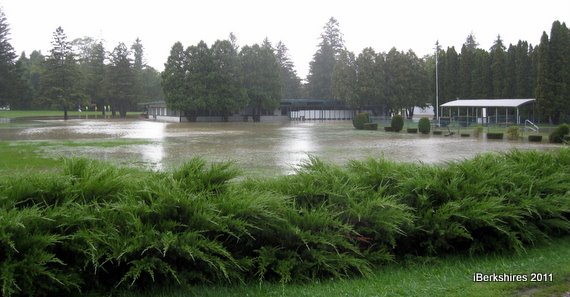Looking Back at Irene: The Spruces
 The Spruces Mobile Home Park remains the most obvious — and disheartening — victim of Irene.
The Spruces Mobile Home Park remains the most obvious — and disheartening — victim of Irene. Some 300 people were forced to evacuate as the waters of the Hoosic River spilled over the banks into the low-lying park.
Nearly two-thirds of the park's residences have been removed or abandoned, its mostly elderly population scattered.
Envisioned as a middle-class retirement community, it had become one of the few affordable areas in Williamstown as the cost of real estate rose exponentially around it.
The disaster has sparked greater efforts in Williamstown to find and promote affordable housing — including the creation of Higher Ground, which started as a loose group to help residents, and town meeting approval of an affordable housing trust.
But that can't replace lost homes, or memories.
Barbara Fisher, who lived with her late husband, David, on Emerald Lane for 16 years, spoke of the good days when neighbors would get together and go for walks around the Spruces.
"I would take David in his power chair. He had pulmonary fibrosis," she explained. He died on July 15, and his widow feels that the stress of losing their home hastened his death. "He was a worrier," she said, "and took it very hard."
After the Spruces flooded and the couple needed a place to stay, a friend took them in. But, "it's hard living in someone else's space," Fisher said.
It was on a shopping trip with a friend to Hillside House in Pownal, Vt., that she found a new home.
"We talked and laughed about how I was looking for furniture when I had no place to put it," said Fisher. "Becky Armstrong [one of the owners] came up to me and said, 'We have a house for rent next to the store.'"
"It's lovely and in a pretty location, but it just isn't the same as living in the Spruces," she said. "I miss the nice neighbors. We were a community."
Jean Plankey, a widow who lived alone in her mobile home on Nutmeg Street, considers herself "lucky" because her son from Florida was visiting her when Irene hit.
"He got my car out before it was flooded. The water came from every direction. We were ankle deep when they boated us out," she recalled. "The first few days after the flood were horrendous. The first time they let us into our homes two or three days after we were evacuated, I only had to take one look to know it would not be inhabitable."
All that she was able to salvage were a few pictures and an address book.
Now Plankey is renting a two-level apartment in Pine Ridge Valley in North Adams.
"It's nice but I miss my home. I lived in the Spruces 20 years, and knew everyone. I still love the mobile home style of living, everything is on the flat, and that's especially good for good for senior citizens like me," she said. "Everyone I meet who used to live in the Spruces says they miss their home and neighbors
"If want a good cry all I have to do is look at my empty lot at the Spruces. It's as if no one ever lived there."
Tom Richards, 70, lived in his car or Good Samaritans until an apartment became available at Franklin Court in North Adams. A few months later, he moved to Rock Manor Mobile Home Park.
"It's half the size of the Spruces, and there is no pool or rec hall, only roads," he said. "But I like mobile home living, you get to meet people."
"What still hurts the most is missing the people I knew at the Spruces. What fun we had! A big group would meet near the pool at night," Richards said, and then added with a laugh. "We would make S'mores. In colder weather, we would meet at the recreation hall. In the library, there were recliners for us old-timers. I wanted to live at the Spruces for the rest of my life."
Despite the devastation he still sees signs of life at the park when he visits a friend there.
"A tree that I used to take care of on my lot on Nutmeg Street is coming back."
Recent Articles
| Spruces Residents Commemorate Year Anniversary of... WILLIAMSTOWN - 08-25-2012 - "Let's make this day about human resilience and recovery." — Peter Elvin. |
| Spruces Diaspora Returns For Irene Commemoration WILLIAMSTOWN - 08-22-2012 - "It's a celebration of the spirit of resilience. That's really what it is." — Robin Lenz |
| Spruces Owners Drop Case Against Williamstown, State WILLIAMSTOWN - 08-07-2012 - "It would not be in the best interests of the Spruces residents to further pursue resolution in court." — Peter... |
| Founder Envisioned Spruces Park as Thriving Community WILLIAMSTOWN - 06-03-2012 - "Things were never the same, as landlords slowly began to change elements of community life that Al believed were... |















